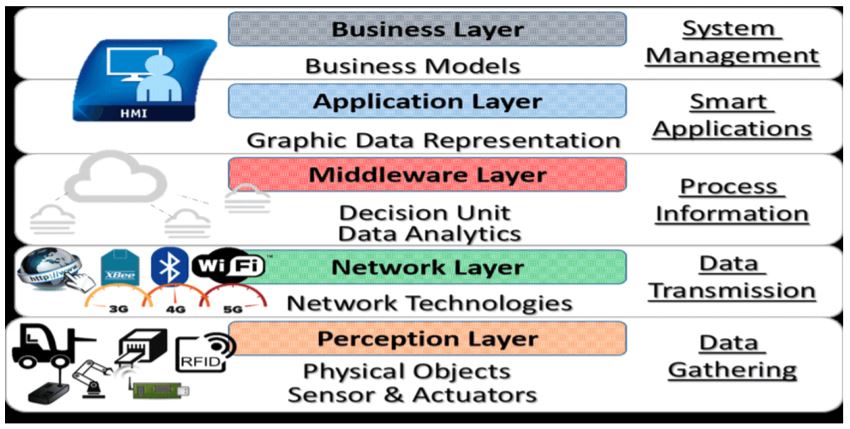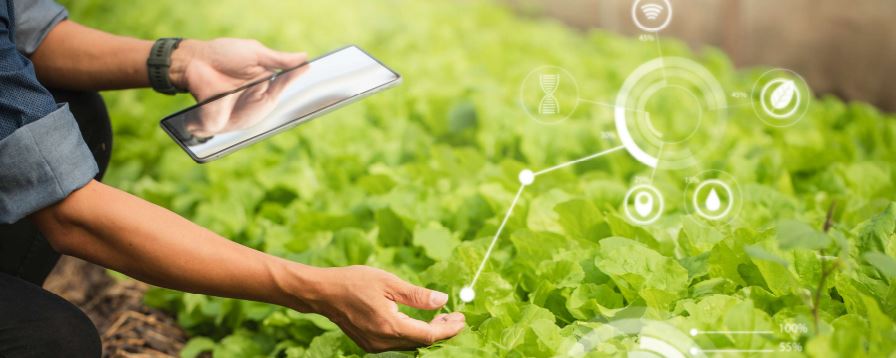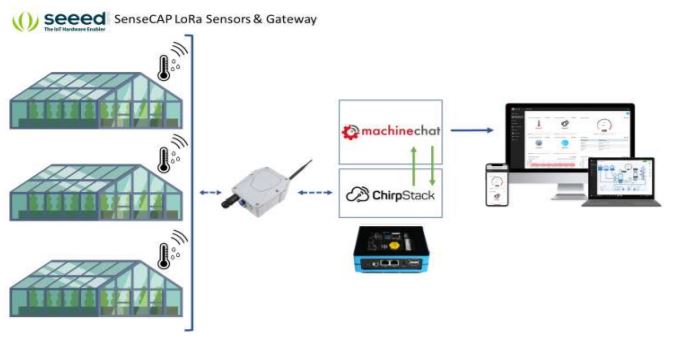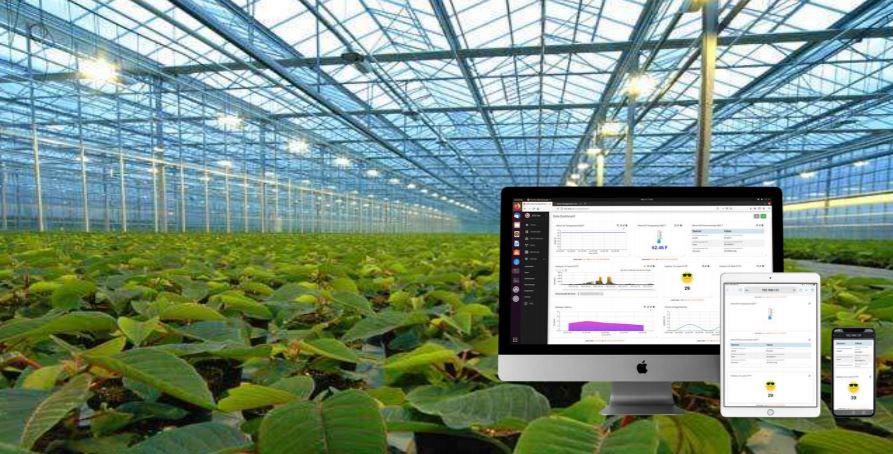Ready to Deploy Solution: Seeed’s SenseCAP and Machinechat’s JEDI One Together Optimizes Greenhouse Operations
By Ye Seong SHIN 4 年 agoSeeed’s IIoT devices – SenseCAP LoRaWAN sensors and gateway – that measures and transfers the data of temperature, humidity, moisture and light intensity – and Machinechat’s software platform (JEDI One) collaborated to accelerate development and deployment of various environmental-monitoring scenarios to optimize greenhouse operations.
Solution: Optimizing Greenhouse Operations
Targeted Industry Type: Greenhouse Farming
Solution Partner(s): 
For innovators, developers, and system integrators, in order to make an IoT project successful, integration of diverse technologies and development of various data transformation measures are fundamental (Figure 1). In Perception Layer, one first needs to decide if they want to custom-make sensors and component parts by oneself, or buy the sensors available in the market. If one chooses to build one, then they would need in-depth knowledge on multifaceted and specialized areas of technical domains, including but not limited to: hardware engineering, mechanical engineering, firmware development, testing, hardware and communication protocol certifications. Based on this, contemporary IoT developers should be able to handle important elements of concerns relating to IoT deployment:
- Data privacy, security and control
- Integration with existing systems and projects
- Power consumption and range of IoT networks
- Time and cost of development, and sustainable path to ROI
- Maintenance and technical support requirements and costs
- Scalability and expandability of IoT systems

Figure 1. IoT Project Deployment Process
ⓒ Machinechat
As for Network Layer, LoRa is increasingly becoming the best choice for IoT deployments in industrial and commercial scenarios. Why? Because in comparison to popular sensor communications technologies (like Wifi, Bluetooth, and cellular transmission), LoRa significantly distinguishes itself from them with the following 4 characteristics that they do not possess:
- Low-power consumption
- Wide geographic range
- Lower infrastructure costs
- Upgraded security
However, you do not need to worry about any complicated deployment processes, because Seeed’s ready-to-use IoT hardware devices and Machinechat’s already-developed software platforms, can help innovators like you to build and disseminate desired projects more rapidly at affordable costs. Indeed, the synergy effects created by Seeed and Machinechat can facilitate developers and system integrators to deploy secure and on-site IoT projects in the matter of days.
What’s the Challenge?
How to develop an affordable, easy-to-deploy and scalable solution for system integrators to wirelessly and securely monitor environmental conditions across multiple greenhouses (Figure 2)?

Figure 2. IoT Solution Deployed in a Greenhouse
ⓒ Machinechat
What’s the Solution?
A system integrator used Seeed’s IIoT devices – SenseCAP LoRaWAN sensors and gateway – that measures and transfers the data of temperature, humidity, moisture and light intensity from a local server to Machinechat’s software platform (JEDI One) in order to display the integrated data and monitor volatile environmental conditions of the greenhouses (Figure 3). Currently, Seeed and Machinechat are partnering with Digi-Key to distribute the solution globally.

Figure 3. Seeed and Machinechat’s IIoT Solution Diagram
ⓒ Machinechat
Founded in 2018, Machinechat’s mission is to be the leading supplier of IoT data management solutions that dramatically accelerate and reduce the costs of developing and deploying IoT projects. Through leveraging software-defined networking principles, Machinechat’s easy-to-use and affordable solutions enable IoT solution architects, developers and networking OEMs to quickly add data collection, process streaming data, monitor data for data management, and incorporate such insights into their products and solutions.
What Are the Product Features?
SenseCAP LoRaWAN is a series of Seeed’s IIoT hardware products. Since it is based on LoRaWAN protocol Class A, the IoT devices are deployable worldwide with multiple ISM bands – EU868, US915, AU915, AS923. SenseCAP is encapsulated in an IP66 enclosure, making it applicable to remote sensing scenarios outdoors, like Smart Environmental Monitoring, Smart Farming, Smart City, and other countless IoT application scenarios that need low-power, long-distance, and long-term data collection features. By providing precise parameters, sensors assist service users to make accurate estimations and predictions of optimal product growth and quality. SenseCAP LoRaWAN devices can survive temperatures from -40℃ to +70℃ (up to 85℃ for SenseCAP sensors). Thanks to its high reliability, stability, long battery life spans, rapid installation and deployment, SenseCAP LoRaWAN products are used worldwide for a variety of industries.
As for JEDI One software (Figure 4), its drag-and-drop function and notifications feature allow easy configuration, enabling both real-time and scheduled alerts depending on the type of the crops grown in each greenhouse. Moreover, JEDI One’s local and customizable storage allows data to be segmented and exported as needed to local and cloud-based applications, enabling the right data to be transferred to the right application at the right time. JEDI One is available for Windows, MacOS, Linux, Raspberry Pi, and BeagleBone. The software is about 30MB in binary size, has responsive and multi-user web interfaces, and excels in secure communications and smart local data storage.

Figure 4. JEDI One Software Platform at a Greenhouse
ⓒ Machinechat
What Are the Benefits?
This combination of ready-made hardware and software will enable the clients to:
- Monitor light, humidity, soil moisture and temperature conditions in real-time and optimize growing conditions in each greenhouse;
- Use collected chronological data to better determine and manage ideal conditions for plant growth;
- Optimize water consumption by preventing over-irrigation;
- Lower overall development and deployment costs;
- Facilitate developers to focus more on business and user-friendly applications and processes that bring the most benefits to the customer (versus getting bogged down in the “rough first mile” of middleware and application layer development);
- Deliver local control over data and reduced cloud data processing costs;
- Improve data privacy, control and security;
- Easily integrate with existing systems and applications;
- Reduces complexity and costs of maintenance and support by using hardware that can be readily purchased off the shelf.
To conclude, innovators, developers, and system integrators can all benefit using Seeed and Machinechat’s ready-made hardware and software tools to accelerate your IoT project ideas to rapidly design, prototype, and implement on the field. Seeed never ceases to innovate and collaborate with our partners and their clients’ sustainable technological innovations.
About Author
Ye Seong SHIN
Sustainability and CSR Manager at Seeed Studio
。
Jointly organize/participate in multi-stakeholder projects/platforms/events/webinars/workshops/hackathons/etc. to accelerate SDGs with local communities and open tech anywhere in the world by connecting with Ye Seong SHIN today on LinkedIn.
。
Seeed Studio is the IoT and AI solution provider for all types of traditional industries’ sustainable digitalization. Since its establishment in 2008, Seeed Studio’s technological products and customization services are used for smart agriculture, smart cities, smart environmental monitoring, smart animal farming, smart aquaculture, meteorological monitoring, STEAM education, and all types of emerging scenarios enabled by the Industry 4.0. With the company’s mission to “Empower Everyone to Achieve Their Digital Transformation Goals” (which shares similar values with SDGs’ Motto of “Leave No One Behind”), Seeed Studio is devoted to using open source technologies for accelerating SDGs with multi-stakeholders from UN agencies, academia, companies, CSOs, governments, public/private organizations, and so on. This is why, Seeed Studio also founded “Chaihuo Maker Space”, and started China’s first Maker Movement by annually organizing “Maker Faire Shenzhen”.

Hi! Gd Morning.
My name is Veera and I am from Singapore. We are domain experts in Botany, Horticulture and Agriculture. We have been trying to develop Smart farming systems for both indoor(CEA/ greenhouses) and outdoor agriculture. We are impressed by your range of sensors and solutions developed so far. We are a service provider for farming and habitat/ecosystem management in Singapore and the region. Our domain knowledge coupled with technical/IoT experience is recognised by our clients. We would like to explore the possibilities of working with your sensors and other devices for this purpose. We are also providing workshops for School children to learn about farming and agriculture here in Singapore. We noted your educational solutions for children. We would like to work directly with you for this sector only and not for other industrial applications. Please get in touch with us soonest for us to take this business opportunity further. Thank you.
Hi Veera, this is Violet from Seeed. So happy to know you are interested in exploring collaboration with us in the field of IoT applications in agriculture/horticulture and education. Shall we schedule a call sometime next week to have an initial discussion? You can reach out to me via email (violet@seeed.cc) or LinkedIn (Violet Su). Thank you very much! Talk soon!